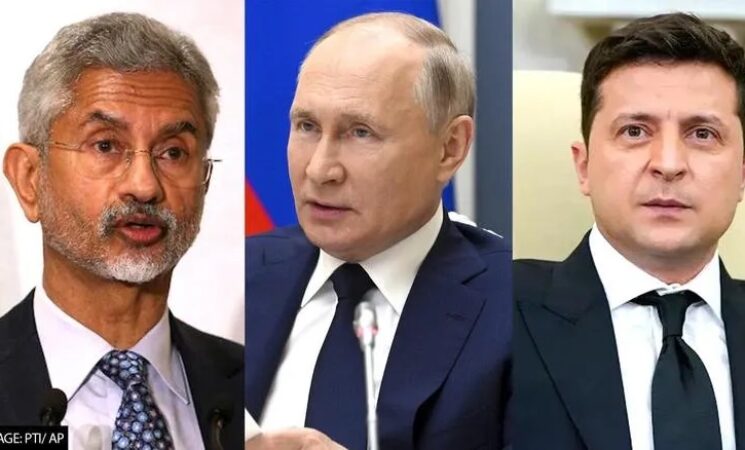26 May 2022, NIICE Commentary 8009
Arushi Anthal
It’s been more than three months since the war commenced between Russia and Ukraine and it has turned the entire international arena upside down. This crisis has divided the world into two blocks - one which views it as Russia’s invasion in Ukraine and condemns it on all major public platforms, another which considers this crisis as a problem but does not explicitly term Russia as an aggressor. India falls in the second block. Although the crisis erupted in Europe, it has affected the world as a whole, for instance, the refugee crisis, the price rise in fuels and so on. The US has publicly condemned the actions of Russia. In fact, most countries have sided with the US and followed its suit by declaring sanctions against Russia.
India has on multiple occasions iterated ‘dialogue and diplomacy’ as the only way to solve this crisis. Although India has condemned the crisis time and again and provided humanitarian assistance wherever possible, yet India has neither named Russia as an aggressor nor declared sanctions against it. It has vouched for an unbiased stance in such turbulent times. Hence, it is immensely significant to analyse India’s stance in the prevalent crisis and how has this stance affected India’s position in the global sphere.
Whilst India has opted for a neutral stance and has decided to stay non-aligned and unbiased in this crisis, it has had a great impact on India’s position in the global sphere. It would not be wrong to say that India has stood out as a responsible power to reckon with in this multi-polar world- a power which is able to put forth its perspective and promote its own national interest.
During the cold war years when the world was divided into two power blocs vis-a-vis the US and the USSR, India opted to stay non-aligned but the reasons then were different as India had recently gained independence and was not in the position to support any of the two blocks as India strived for maintaining stability and sovereignty both internally and externally. During this period, India also witnessed wars with China and Pakistan. Although India stayed non-aligned, it signed a Treaty of Peace and Friendship with the erstwhile USSR in 1971, hence India is said to have slight inclination towards the erstwhile USSR. So, yes, it is true that Indo-Russian relations go way back. In fact, Indo-Russian relationship was acknowledged by the United States Secretary of State Blinken too in a recent joint press statement post ‘2+2’ dialogue wherein he iterated, “That relationship took hold many years ago at a time when, as I said, we were not able to be a partner of India.”
The Ukraine Crisis has affected India’s position in multifarious ways. Generally, India is perceived as a developing nation which has a long way to go but its diplomacy during this crisis is remarkable. India’s standpoint on the crisis has turned out to be a stance in itself, an inspiration for other developing countries to promote their own national interests even in dire circumstances and not succumb to such occurrences. India’s outlook on the crisis has strengthened multipolarity and clearly elucidated that the world of today is not naive enough to be divided into two power blocks. While many perceive India’s stand to be inclined towards Russia as Russia is India’s major defence partner, it is pertinent to view the situation impartially.
It is affirmative that, despite many statements by the US officials, India did not publicly name Russia as an aggressor but it is equally important to note that India had abstained from voting in the UN General Assembly on the resolution of suspending Russia from the UN Human Rights Council despite prior warnings by Moscow. India’s position in this crisis should not be viewed as its inclination towards the US or Russia, rather it should be apprehended as India’s step to strengthen its own position in the global affairs - a position with which it can promote its own national interests. In fact, it would be apt to term India’s stand as a paradigm shift in the way India has pursued its foreign policy. The interest in India by the world can be seen as the world dignitaries streamed into India for talks and dialogues. Until now India has managed to retain its stance and not cave in to external pressure by holding meetings and talks with all major stakeholder’s vis-a-vis the Russia, Ukraine, the US, European Union etc.
Another impact on the position of India is its increased relevance in the contemporary world scenario as a responsible power. The Western powers are leaving no stone unturned to influence India’s stand on the crisis. In the recent Indo-US ‘2+2’ dialogue, the US acknowledged India as its ‘security partner of choice’ which in itself proves India’s significance. It is affirmative that the US is a superpower and is a valuable ally but India is equally important to the US especially if the Indo-Pacific is taken into consideration. India’s ability to delicately balance both the US and Russia has proved India’s prowess at diplomacy.
Lastly, one of the most pressing issues is how long can India maintain its relevance and balance its diplomacy when major powers such as the US are involved. Although the crisis erupted in Europe, it has affected the world in all its entirety. The question of the hour is that in this interdependent and multifaceted world, how long can India stay neutral and unbiased when the crisis has affected its own economy too. All India can do is brace itself for all that the future beholds.
Arushi Anthal is a Research Intern at NIICE.

